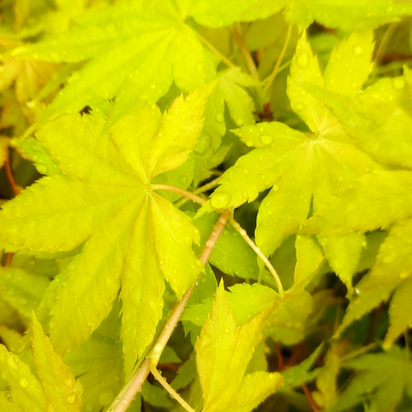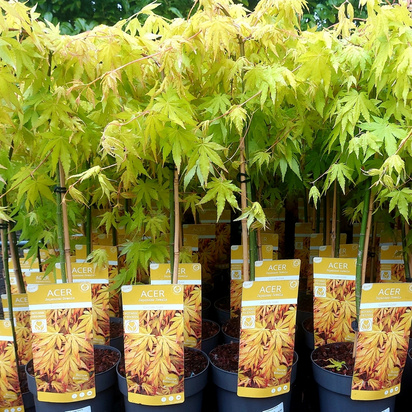Check Here Before Buying – Pot Size Matters...Not all websites offer the same. Plants in a 2-litre pot have twice the root system of a P9 or 1 litre pot.
'Cascade Gold' is a compact, columnar, weeping, deciduous shrub or tree to 1m tall. The leaves are yellow-orange with orange-red margins in spring, turning bright green in summer and yellow-orange to orange-red in autumn
Buying Perennials from Jacksons Nurseries
At Jacksons Nurseries we lightly trim back our perennials after flowering and trim them back at the end of the season to ensure that the plants remain neat and tidy whilst in the pot. The more tender the plant the less we cut back to help protect exposed stems from winter frost. Depending on the plant variety we will then prune back further in spring once the risk of the more severe frosts is over.
As a result, depending on the time of year you buy perennials, they may not look like images showing their ‘prime time’ in flower and looking at their best.
From late autumn onwards and dependent on variety, there may be very little visible above the soil except for a few cut back dormant leaves or stems. It is perfectly normal for dormant plants to look like this from autumn onwards, they will however burst back into life in spring.
Availability: Stock availability figures are provided as a guide only. There is a delay between orders being placed and the plants being gathered by our pulling team. During this time it may be possible for a member of the public to purchase these plants from our Garden Centre, while this is rare it is a possibility and we will notify you of any problems as soon as possible. This figure may also include plants that have not yet be flagged as unsaleable.
Pre-order: Pre-order times are given as a guide only and may vary dependent on the growing season. Orders containing Pre-ordered products will be shipped as a single order when all items become available. Large orders may be part shipped, please contact us on 01782 502741 or email sales@jacksonsnurseries.co.uk.
Grafting & Leaf Reversion
The main purpose of grafting ornamental plants and trees is to combine features of one variety with the more vigorous or resilient root stock of another. Grafting of Japanese Acers also has the added benefit of controlling the height of the tree depending on where the graft has been made.
When a Japanese Acer has been grafted some leaf reversion may take place or incorrect growth from the grafted base. If this occurs, pinch or prune out the incorrect stems once the leaves have fully unfurled.
Cultivation & Pruning
The perfect conditions for growing Japanese Acer would be well drained loam, slightly acidic and sandy with a good amount of organic matter but they will grow in most soil types. Avoid overly wet, dry or alkaline conditions.
Positioning your Japanese Acer will depend on the variety but most will grow best in a sheltered position. Green-leaved trees will tolerate full sun but some shade in the brightest of conditions will help prevent scorch. Red/Purple leaved trees will need some sun to help their develop their rich colours while variegated leaved trees are more suited to partial shade as they are more susceptible to scorch from the afternoon sun.
Mulch your Japanese Acer every other year with well-rotted garden compost or manure. During early establishment ensure that mulch does not come into contact with the collar.
Japanese Acer have shallow fibrous roots and are ideal plants for growing in containers. Ensure good drainage and do not over water. Feed in spring and early summer with a slow release fertiliser or a liquid feed. Try to avoid potting your Acers in overly large pots, start out with a pot approximately 5-8cm/2-3in larger than the pot it was in when purchased and re-pot by the same increase every couple of years, ideally in April or September.
Pot grown Acers are particularly vulnerable to winter frosts. Wrap your containers with fleece or bubble wrap.
Japanese Acers require very little pruning, allowing your tree to grow naturally will be the best way to produce a graceful shaped specimen. You may however wish to prune badly positioned or crossing shoots to encourage a better form, in this case pruning is best done when the tree is fully dormant usually from November to February, pruning outside of this window may result in a weakened tree.
Potential Problems
Japanese Acer are very prone to leaf scorch in both windy or excessively sunny positions. Red/Purple leaved varieties with green leaves or poor autumn colour may indicate insufficient light levels.
Horse chestnut scale and other scale insect damage can be a problem as can verticillium wilt. Pot grown trees can also be a target for vine weevils.
No posts found





